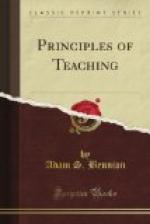What was true in this case is inevitably true in the case of all real teachers. What a man is breathes a power of conversion that no force or argument can equal. Hence this concluding chapter—Conversion, the Real Test of Teaching.
First of all, we are concerned with the conversion of the teacher; secondly, with the conversion of the pupil. They are inseparably interwoven. Only the converted teacher can make converts of his pupils. And surely there is very great need of this very thing—the making of real converts of our boys and girls that they may come fully to appreciate the significance of the Gospel of Jesus Christ. Upon them rests the carrying forward of that great work which only the conversion of our pioneer forefathers could have achieved.
In the first place, the converted teacher believes what he teaches. There is no half-hearted attitude toward the subject in hand. To him it is both true and vital. He teaches with a positiveness and an assurance which grip pupils. What a difference between the speech in which a speaker merely makes certain observations—sets forth certain specified facts—and the speech in which those same facts are heightened by that glow of conviction which stamps them as indispensably essential to proper living. The prayer of a man who does not believe in prayer is an example of the emptiness of unbelief. There is one minister in Chicago who openly announces that God does not and can not answer the prayers of mankind. And yet he prays. And what mockery is his praying. Mere words. No man is ever touched by such an empty form. Such prayers have none of that Heaven Force which establishes communion with the Lord. Surely “They draw near me with their lips, but their hearts are far from me.”
To everyone comes the experience of listening to the heavy phrases of him who would argue and harrangue his auditors into salvation. How his words seem not only to close their minds, but to shut their hearts as well. He fairly talks so loudly that they can’t hear him. And then some humble follower of Him who shunned the orator’s eloquence moves to tears the same audience by his simple utterance of what he knows and feels to be true. He adds the conviction of conversion to mere “hard-headedness.” When a man knows that which he teaches is true there is a spirit that gives power to what he says. “The letter killeth, but the spirit giveth life.”
The experience of a Montana railroad executive gives force to this thought. He told one of our leaders how he had always been impressed with the achievements of our Church. In fact, he became such an admirer of the wonderful organization of the “Mormon” Church that he decided to adopt the same kind of organization in his railroad. To quote: “I thought if I could apply the same system up here that you have in the ‘Mormon’ Church it would work just the same for me as it did for you. I have copied its plan with the First Presidency, the Council of the Twelve, the Presiding Bishop, and all the other officers. I have tried it—but it wouldn’t work for me.” Only a Latter-day Saint can fully understand why.




